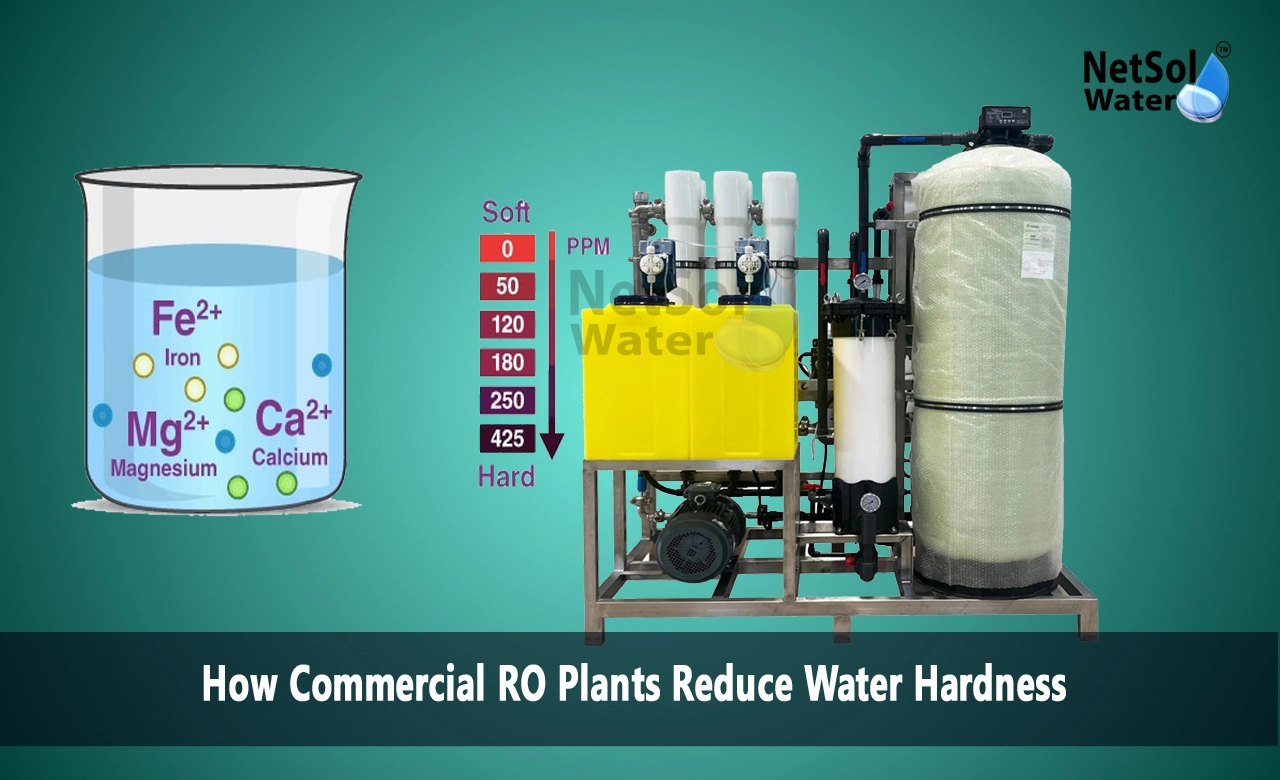How Commercial RO Plants Reduce Water Hardness?
Many organizations and homes experience the challenge of hard water. High amounts of dissolved minerals notably calcium and magnesium describe hard water. These minerals create scale formation in pipes appliances and industrial equipment. Commercial RO plants offer a solution to this issue. They utilize contemporary filtering technology to remove these minerals and provide soft water. We will discuass how commercial RO plants remove water hardness and their benefits for varied applications.
Water Hardness
Water hardness refers to the concentration of dissolved minerals in water. Higher levels make water harder. Water takes up these minerals as it passes through soil and rock formations.
Types of Water Hardness
Two basic categories of water hardness exist:
1. Temporary Hardness: Bicarbonates of calcium and magnesium cause this type. Boiling removes temporary hardness.
2. Permanent Hardness: Sulfates and chlorides of calcium and magnesium cause this type. Boiling cant remove it. It necessitates comprehensive treatment approaches.
Problems Caused by Hard Water
Hard water leads to many issues:
· Pipes and appliances develop scale accumulation
· Heating systems become less efficient
· Soap scum forms readily
· Skin and hair grow dry
· Clothing and dishes get soiled
· Industrial processes take more energy
These problems underline the demand for adequate water softening solutions specifically in commercial and industrial environments.
Introduction to Commercial RO Plants
Reverse osmosis (RO) filters water using a semi-permeable membrane to remove ions molecules and larger particles. Commercial RO plants use this technology on a massive scale to treat water for many applications.
How RO Works?
RO works by pushing water through a semi-permeable membrane under pressure. The membrane has small pores that allow water molecules to flow but limit bigger molecules like dissolved minerals salts and other contaminants.
The process comprises numerous steps:
1. Pretreatment: Larger particles get eliminated to safeguard the RO membrane.
2. Pressurization: High-pressure pumps pressurize the pretreated water.
3. Separation: The pressurized water flows over the RO membrane separating dissolved solids from water.
4. Collection: The system gathers purified water (permeate) and releases or recycles concentrated rubbish (reject).
RO Plants and Water Hardness Reduction
Commercial RO plants successfully remove water hardness. They achieve this through:
Removal of Dissolved Minerals
RO membranes remove up to 99% of dissolved minerals including calcium and magnesium ions that cause water hardness. This high elimination rate makes RO one of the most effective technologies for making soft water.
Handling Different Types of Hardness
RO plants target both transient and permanent hardness. Unlike simpler techniques RO removes all kinds of dissolved solids independent of their chemical makeup.
Consistent Performance
Commercial RO plants handle huge quantities of water consistently. They sustain performance over time delivering a reliable supply of soft water for industrial processes or municipal water treatment.
Components of a Commercial RO Plant
A typical commercial RO plant consists of several basic components:
1. Pretreatment System: This may comprise sediment filters activated carbon filters and water softeners.
2. High-Pressure Pumps: These provide the necessary pressure to drive water through the RO membrane.
3. RO Membranes: These semi-permeable membranes extract dissolved solids from water.
4. Post-treatment System: This may involve remineralization or pH adjustment.
5. Control and Monitoring Systems: These ensure optimal operation and allow real-time adjustments.
Benefits of Using Commercial RO Plants for Water Softening
Commercial RO plants offer many advantages over alternative water softening methods:
High Efficiency
RO plants remove up to 99% of dissolved particles making them incredibly efficient at providing soft water.
Reduced Chemical Usage
Unlike ordinary water softeners RO plants don't require regular addition of salt or other chemicals.
Versatility
RO plants manage water with different levels of hardness and react swiftly to meet changing water quality needs.
Space Efficiency
Despite their huge capacity commercial RO systems have a comparably modest footprint compared to other water treatment technologies.
Cost-Effectiveness in the Long Run
While initial investment may be bigger RO plants could be more cost-effective thanks to their efficiency and reduced operational expenses.
Applications of Commercial RO Plants
Commercial RO units have uses in several industries and sectors:
Industrial Manufacturing
Many manufacturing activities require soft water to prevent scale accumulation and maintain product quality.
Food and Beverage Industry
Soft water helps maintain consistent product quality and prevents equipment from scale accumulation in food and beverage processing.
Pharmaceuticals
The pharmaceutical industry uses RO plants as part of a multi-step purification process for ultra-pure water in drug production.
Power Generation
Boilers and cooling towers in power plants use soft water from RO plants to work efficiently and avoid maintenance expenses.
Municipal Water Treatment
Some towns deploy RO plants to treat hard water before distribution notably in places with naturally hard water sources.
Conclusion
Commercial RO plants have altered how corporations cope with water hardness. They deliver an efficient reliable and cost-effective technique for generating soft water proving invaluable across several sectors. As technology improves we should expect even more inventive solutions in water treatment.
Understanding the capabilities and benefits of commercial RO plants is crucial whether youre running a manufacturing facility food processing business or municipal water treatment system. Harnessing the power of reverse osmosis provides a consistent supply of soft water saves equipment and boosts overall operational efficiency.
To explore customised commercial RO plants, Industrial RO plants, ETP or STP solutions for your needs in your areas and nearby regions, contact Netsol Water at:
Phone: +91-965-060-8473, Email: enquiry@netsolwater.com



